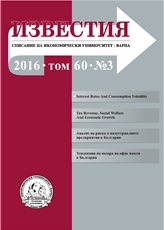Interest Rates and Consumption Volatility:
any Implications for Consumption Smoothing?
Interest Rates and Consumption Volatility:
any Implications for Consumption Smoothing?
Author(s): Ibrahim AlleySubject(s): Supranational / Global Economy
Published by: Икономически университет - Варна
Keywords: lending rates; saving rates; consumption volatility; consumption smoothing
Summary/Abstract: The roles of market interest rates in consumption smoothing have been fairly examined; their effects on consumption volatility however in various country groups have received limited attention. This study aims to estimate the effects of these rates on consumption volatility based on data from developed and developing country samples. The General Method of Moments (GMM) and the Two Stage Least Squares (2SLS) estimation techniques employed, due to the endogeneity property of the specified model, yield interesting results. Lending rates reduced consumption volatility in developed countries while saving rates did not worsen it. The rates had no effect in developing countries and mixed effects in the whole sample. The rates are relatively lower in developed countries and this partially explains why consumption volatility is lower in developed economies than in developing counterparts. As a result, the developing countries need to implement policies to reduce interest rates as a means of reducing consumption volatility and thus enhance consumption smoothing and maximise their welfare.
Journal: Известия. Списание на Икономически университет - Варна
- Issue Year: 60/2016
- Issue No: 3
- Page Range: 255-280
- Page Count: 26
- Language: English

